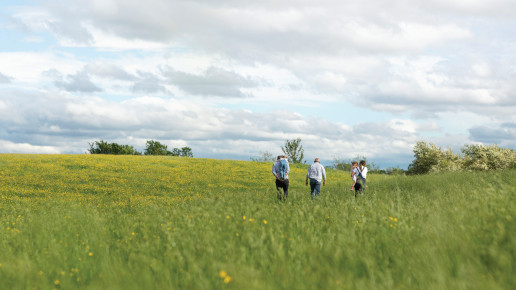
Does harvest leave your farm family with a kind of stress-induced hangover, chock full of regrets about words said and actions taken in the heat of a hectic season? “It doesn’t have to be like that,” says Elaine Froese, a certified coach and author who helps farm families learn how to communicate their way to better farm and business relationships.

“More often than not, the source of stress is the situation, not the people, but it can feel personal when everyone is on edge from working long days and feeling pressured to get the crop off” CARRIE POLLARD CO-FOUNDER NATIONAL FARMER MENTAL HEALTH ALLIANCE
“When people call and I ask them what’s their main desire for coaching, the two most common desires they say are better communication and how to get along,” says Froese. As part of a family farm business that harvests 5,000 acres of certified seed in Manitoba, Froese wants people to understand that these two desires are intrinsically linked. People who communicate well find ways to get along, and people who get along find ways to communicate well.
“Communication is key for the farm and relationships,” agrees Carrie Pollard, a registered social worker and long-time psychotherapist who also works with farm families. Married to an Ontario grain farmer, the mother of five co-founded the National Farmer Mental Health Alliance that provides workshops, webinars and therapy for individuals, businesses and communities engaged in agriculture.
Pollard says there are business and mental health reasons for prioritizing better communication. The mistakes, mishaps and mis-directions that occur when people are not communicating well exacerbate stress, irritability and misunderstanding. “More often than not, the source of stress is the situation, not the people, but it can feel personal when everyone is on edge from working long days and feeling pressured to get the crop off.”
IN-PERSON, RADIOS AND APPS: THE RIGHT TOOL FOR THE JOB
Since communication is all about sharing information, Pollard and Froese advocate that farm families think about how they can communicate most effectively. Knowing that in-person communication releases a neurohormone that mitigates the negative effects of stress and increases collaboration, most days on the Pollard farm begin with a morning staff meeting in the shop. “It allows everyone to catch up and make a plan for the day,” says Pollard.
Like the Froese family, the Pollards use two-way radios to connect throughout the day. The Pollards also use text messages to share specific information about the day’s work, including which fields they’ll harvest and in what order. “My husband and I find texts helpful for staying in touch throughout the day and our children love to FaceTime with him,” she says.
Froese knows families who use WhatsApp messaging to keep everyone on the farm in the same conversation. While that can be effective, she cautions all to take care to ensure messages are not misunderstood.
TIPS FOR BETTER COMMUNICATION
In addition to communicating clearly and often, Froese and Pollard offer some specific ideas farm families can use to lower the emotional intensity of a busy harvest season. If these are new to your family and staff, call a meeting to explain what you’re trying to do.
Set standards. Froese sees value in setting standards of behaviour that reflect your farm family’s values. The Froese farm, for example, values honesty, timeliness, teamwork and integrity. Those principles set the standards for acceptable conduct. There’s no profanity, no slamming doors or tossing wrenches. If you need a few minutes to gather your thoughts, you ask for them. When someone else needs a few minutes, you respect the request. When conflicts arise, she says, you address it rather than avoid it.
Ask powerful questions. Harvest is stressful and people will disagree about the work at hand. When you can’t avoid conflict, manage it and then collaborate to create solutions, says Froese. Two of the most important questions you can ask are: “How can I help you?” and “What would you like me to do?”
Call out bad behaviour. Everyone on the team can make a mistake. “Attitude is everything because you decide how you’re going to respond to all the sideswipes of harvest,” says Froese. She suggests people stand up to bad behaviour. Name it, then reach out. This is a time for “How can I help you?”, “What would you like me to do?” and, when necessary, offer an option, “Do you need some time to cool down?”
De-escalate and repair. Don’t let bad feelings fester, says Pollard. Deal with the situation, then take action to de-escalate an argument or disagreement. This minimizes lasting harm. “As emotions are often running high during harvest, things can be said or done in the heat of the moment,” she says.
De-escalation enables what relationship experts call, relationship repair. “This might be saying ‘sorry,’ but it could also include making a joke on the two-way radio or bringing someone a coffee in the field,” says Pollard.

“When people call and I ask them what’s their main desire for coaching, the two most common desires they say are better communication and how to get along” ELAINE FROESE CERTIFIED COACH AND AUTHOR
Reach out. Reach out to reset, says Froese. In the early days of the pandemic, Froese made it her business to phone people she cared about but couldn’t visit in person. The benefits were mutual and a helpful reminder of how an honest chat with a good listener can relieve stress and shift perspective.
Froese also urges farmers to develop emotional supports, like knowing when to call a friend or a farm support line. When men tell Froese they’re not good communicators, “I always say, ‘not yet,’ because I believe that they don’t have to keep subscribing to that story.”
One hour with a communication specialist or therapist equals 0.5 per cent of your work week, says Froese. “You can take an hour to talk to someone in the quiet of your home or office or truck.”
Practice self-care. It’s important that farm families develop healthy approaches to stress management — approaches that might mean steering clear of social media to focus on the people you live and work with, adds Froese. Sleep and good nutrition also aid robust communication and conflict management skills. “Your body is not a machine.”